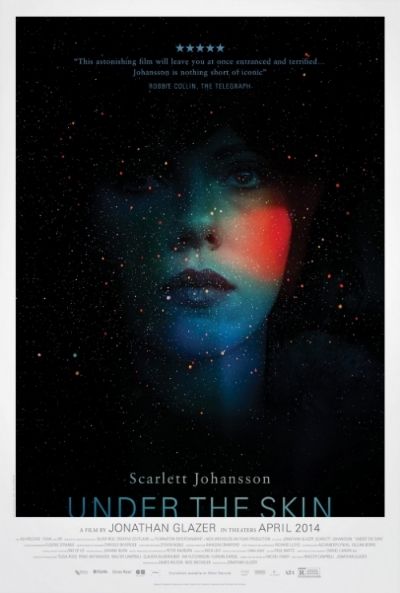← Back to Reviews
in
Under the Skin
(Jonathan Glazer, 2013)
+

Jonathan Glazerís Under the Skin stars Scarlett Johansson, in a wonderfully nuanced performance, as an alien who seduces men, luring them into a dilapidated apartment building where a room with a pool of black goo brings them to their death. Eventually, she attempts to seduce a disfigured man, but feels sorry for him and lets him go. Because of this, she has to flee from those who were once helping her.
Under the Skin is a seemingly indecipherable film, which means itís hard to sum up. Despite its ambiguity, itís a film that will have you thinking long after itís over, and itís not impossible to explain the events somehow. In fact, the interpretation you have may differ from someone else's. Iíve not read the book, but have read the plot outline and it seems to me as though Jonathan Glazer decided to make it a separate entity from its source material, making it far more open to analysis.

The film echoes John Lockeís philosophy of tabula rasa. To Locke, humans start out as a blank slate, without any identity, and through experience define themselves. The film begins with the alien learning to act as a human being, by wearing human skin and learning English. Over the course of the film, she discovers emotion, sympathy, desire, and in this way there is a newfound humanity in her.
Mica Levi, who usually goes by her stage name Micachu, has created an eerily memorable score for Under the Skin. It differs from the more upbeat, experimental pop of her band, Micachu and the Shapes, going for something that could be the music of a nightmare.

In the end, Under the Skin will most definitely become something of a cult classic. Itís too strange to find mass appeal, but is sure the captivate some with its terrifying, surreal, dreamlike and thoughtful nature.
(Jonathan Glazer, 2013)
+

Jonathan Glazerís Under the Skin stars Scarlett Johansson, in a wonderfully nuanced performance, as an alien who seduces men, luring them into a dilapidated apartment building where a room with a pool of black goo brings them to their death. Eventually, she attempts to seduce a disfigured man, but feels sorry for him and lets him go. Because of this, she has to flee from those who were once helping her.
Under the Skin is a seemingly indecipherable film, which means itís hard to sum up. Despite its ambiguity, itís a film that will have you thinking long after itís over, and itís not impossible to explain the events somehow. In fact, the interpretation you have may differ from someone else's. Iíve not read the book, but have read the plot outline and it seems to me as though Jonathan Glazer decided to make it a separate entity from its source material, making it far more open to analysis.

The film echoes John Lockeís philosophy of tabula rasa. To Locke, humans start out as a blank slate, without any identity, and through experience define themselves. The film begins with the alien learning to act as a human being, by wearing human skin and learning English. Over the course of the film, she discovers emotion, sympathy, desire, and in this way there is a newfound humanity in her.
Mica Levi, who usually goes by her stage name Micachu, has created an eerily memorable score for Under the Skin. It differs from the more upbeat, experimental pop of her band, Micachu and the Shapes, going for something that could be the music of a nightmare.

In the end, Under the Skin will most definitely become something of a cult classic. Itís too strange to find mass appeal, but is sure the captivate some with its terrifying, surreal, dreamlike and thoughtful nature.
